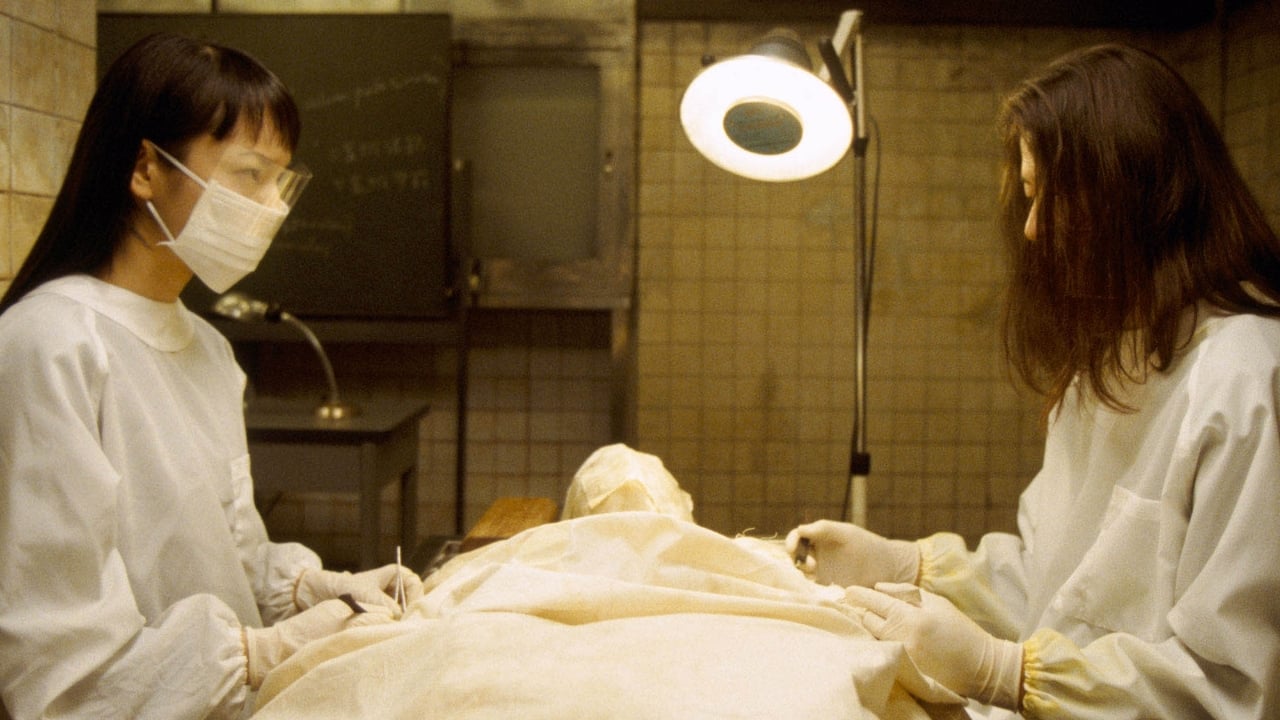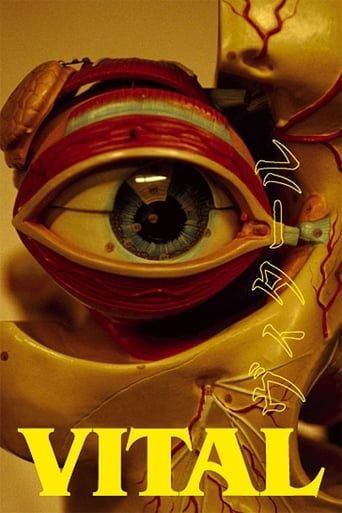

I love this movie so much
... View MoreWonderful character development!
... View MoreTied for the best movie I have ever seen
... View MoreThe thing I enjoyed most about the film is the fact that it doesn't shy away from being a super-sized-cliche;
... View MoreAfter a car crash that leads to the death of his girlfriend, a young medical student must regain the memories he's lost of her while dissecting her body in anatomy class, watched over by the careful scorn of a new love interest, the original girlfriend's father and dying mother, his own concerned parents, and the class's professor and students. With love scenes involving mutual erotic asphyxiation, dance and theatre added to a stylistic cinematic structure, and flash-backs, dream sequences, and flash forwards all given equivalent value with the same structural equivalent, Shinya Tsukamoto explores a rather direct territory of Eros and Thanatos while wrestling with history, memory, subconscious, and loss. Thematic quote du jour: "How can I compete with the perfect happiness of false memories?" An interesting contextual aside, Tsukamoto's famous Tetsuo: The Iron Man also revolves, plot-wise, around a half-remembered car accident and the ripple-effect of relationships and memories it destroys. I haven't done enough research into Tsukamoto's life myself to know if there was a particularly horrific car accident he was involved in, but the usage is in fitting with his general themes between organism and technology, reflected in Tetsuo as a man slowly turning into a scrapheap and in Vital as a robot from the future experiencing an electrical surge of mankind's memories before being destroyed on the planet Mars, or the contrasting book-ending images in the movie itself of smokestacks at the beginning and rain and nature at the end.As a final note for recommendation's sake, this movie is 85 minutes long and feels like 15.
... View MoreShinya Tsukamoto is a director best known for his violent, hard-hitting and heavily industrial-influenced art-dramas, such as the 1988 cult-classic Tetsuo: The Iron Man and it's somewhat poorly received 1991 follow up Tetsuo II: Body Hammer. These films are placed alongside his two contemporary masterpieces, Tokyo Fist and A Snake of June. Whereas those films were fast, furious and hyper-kinetic affairs, punctuated by grainy cinematography, punch-drunk editing and a soundtrack of jarring industrial noise, Vital finds the maverick filmmaker in a slightly more poetic and philosophical mood; creating a slow and lingering film that looks at the notions of love and loss through the eyes of a central character trying to both understand and come to terms with the death of his free-spirited former lover.As with much of Tsukamoto's work, the film is rich in visual symbolism and texture, with the opening scene disorientating us with a kaleidoscopic montage of four industrial chimney-stacks pumping smoke into an overcast sky. Later on, after enrolling in a medical course at his local college, our protagonist will witness four bodies being dissected, including, surprisingly enough, that of the central character's deceased love. This is the central arch of the story and the location where much of the film unfolds, with Tadanobu Asano's character Takagi piecing his life back together as he literally picks apart the body of his former lover and comes to terms with his own role in the loss of her life. As you can probably imagine from a story of this nature, the film is incredibly slow-moving and deliberately paced, with Tsukamoto juxtaposing the coldness of Takagi existence of continual study and cultural isolation with the rich, warm vibrancy found in that of his late girlfriend's wild and unfettered existence on an island paradise that may or may not exist only within the fragmented mind of Takagi himself.The scenes of Takagi and his fellow medical students dissecting the rotting flesh and hollowed bones of the four symmetrically positioned corpses is sympathetically handled, with the director creating a mood of unease through the use of a sickly yellow lighting filter, so that the film manages to create an air of queasiness and uncertain anxiety without having to show anything too explicit. There are further examples of Tsukamoto using the lighting and cinematography to underpin the emotions of the character within other areas of the film, for example, the scenes in which Takagi works on his studies or reminisces about the ghosts of his life, pre-accident, are bathed in a cool blue that recalls the cold and clinical cinematography of A Snake of June, which again, brings out the sense of cold alienation central to the character's life. These colour-coded motifs are further juxtaposed by the bright and vividly beautiful colours found on the island that Takagi dreams of, recreating or reliving a brief moment of transcendence with a lover he'll never again reclaim.Vital is quite an anomaly within Tsukamoto's career thus far; standing out a slower, more deliberate and more poetic work with the emphasis placed on human emotions as opposed clinical psychology. There are still the various recurring themes on display, for example, the obsession with the fragility and the limitations of the human body; something that has been explored and exploited throughout Tsukamoto's work from Tetsuo through to Tokyo Fist and beyond to Vital and A Snake of June. As I mentioned previously in this review, the pace of Vital is slow and deliberate throughout, whilst the overall tone of the film is dreamlike and filled with uncertain. Many will no doubt find it a little dull and perhaps even boring, but many others will perhaps appreciate the believable characterisations and the rich compassion and emotion that Tsukamoto brings to the script, especially when coupled with the captivating cinematography, evocative music and air of metaphysical mystery.
... View MoreShinya Tsukamoto has to be one of the greatest living-directors of our time. He is absolutely uncompromising in his visions, and is one of the very few-directors who actually owns his films, rejecting most outside-financing. The results are always spectacular, and undiluted by the money people who constantly ruin the projects they fund. It must be a heavy-burden to shoulder all of the praise and the blame, as Tsukamoto often acts as producer, writer, actor, cinematographer (as with his "Bullet Ballet"), and even film-editor. The man is unstoppable, like many of his film-protagonists, and he is a testament to the power of discipline. Even Takashi Miike admits he's an admirer and will never top Tsukamoto.This tale was created entirely by Tsukamoto, and certainly has elements of autobiography to it, and he continues his theme of the desensitizing-nature of urban life in all its mind-numbing routines. Again, his characters are attempting to punch-through the drudgery to a more-fulfilling life. Sometimes they succeed. The story concerns a medical student named Hiroshi who has suffered amnesia in a car-accident. His lover was killed in this accident. He returns to live-with his parents, who he doesn't remember--in-fact, he has forgotten his past entirely. One day, he discovers one of his old anatomy-textbooks hidden-away, and decides to return to medical school. He also finds many drawings he did before the accident. Over-time, it becomes clear that he once wanted to be an artist, and felt-pressured by his parents to be a doctor. Returning to medical school, Hiroshi rapidly-excels and reaches the dissection-stage of his education. There is a problem--the cadaver is his lover...This is lyrical-art, nothing-less. The makeup of the cadavers is astonishing, and was done with plastic-molding and latex. It looks entirely-real. As Hiroshi delves-deeper into the body of his dead-lover, he remembers more-and-more of what happened before the accident. So, if you like grue and gore, you'll like THAT part of this film, just don't expect viscera and fluids everywhere. Vital is more cerebral than that, and this is not a gorefest, there is meaning to this. There is a confrontation-with-mortality here that Americans are incapable of creating in our culture, but it also says that the dead speak to us. We just never listen. If I tell you more, it will only ruin your curiosity and the viewing-experience, which is best experienced virginal. This is a story of discovery, and identity. It is the essence of being-human, and being empathetic and caring. It also celebrates the beauty of the human-body in ways I never imagined, a visual-feast.The Tartan DVD couldn't be any-better. The image-quality is superb, as is the audio (DTS, and stereo-versions are very-active). While this is a film that lasts a mere 80-minutes, it is a very full-experience, and the added-features on the DVD are great, including an audio-commentary by Miike and Tsukamotot-scholar, Tom Mes, interviews, and more. So, gorehounds, this is a beautiful film with some very deep-meaning about what it is to be human and caring. Correct, gorehounds will be bored, but who cares? This is high-art by a totally independent filmmaker, it doesn't get much-better than this.
... View MoreI was mostly disappointed with this film. I'm a fan of Tsukamoto's other work, and while this film indicates his growth as a director, and has a strong cast, I felt it had issues with pacing, and a pretty dissatisfying ending.Asano Tadanobu, normally an engaging lead, seems to be coasting through this film, brooding, mainly. Of course, maybe that's how his character was written, but I found myself wondering when it would pick up in several places and unable to identify with him.Kunimura Jun is wonderfully powerful as Ryoko's father, and I wound up wishing he was more of a central character. I also felt Ittoku Kishibe, who can conjure a truly menacing screen presence, was rather wasted as Dr. Kashiwabuchi.There are some interesting philosophical questions raised, but they are never really addressed or explored fully. I guess I'm also getting tired of the "I don't know whether I'm dreaming or awake" cliché in many movies in this genre. Plus, it's a little ham-fisted to have a character just come out and say that.Vital contains a few interesting scenes involving a dance, and some of Tsukamoto's signature music video-style strangeness in a few places, but in summary, a slow, dark film with no real scares or thrills.
... View More